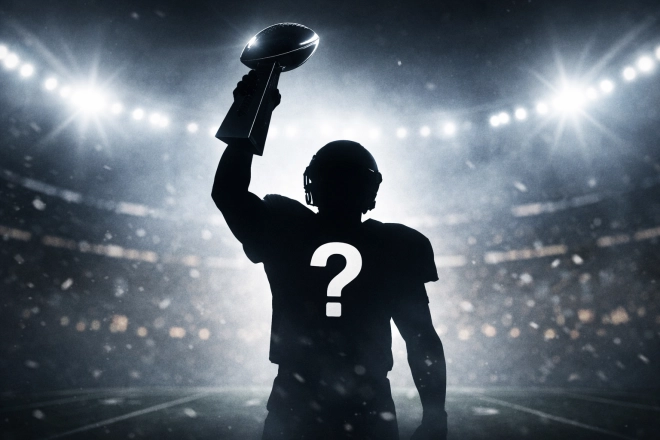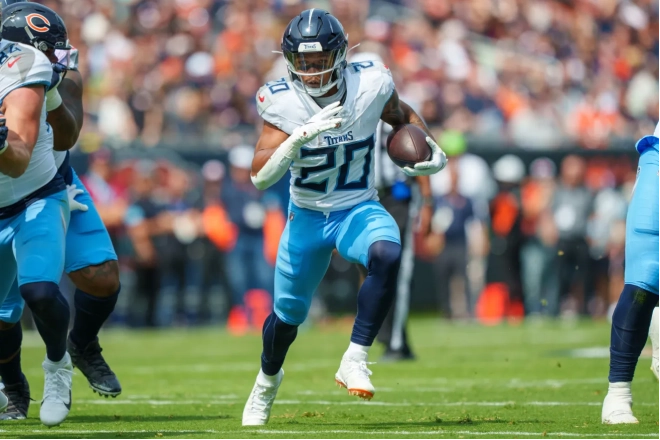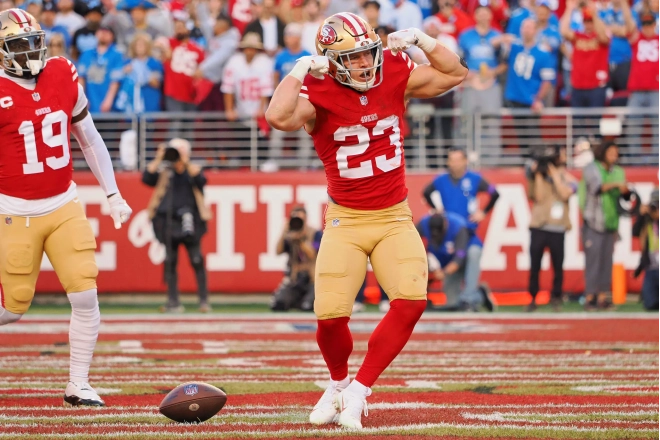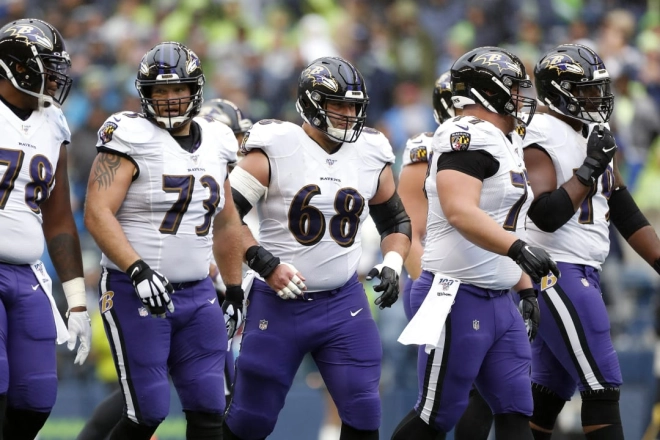In the NFL, a team's offensive line can make or break a season. The unsung heroes of the gridiron, these linemen are tasked with creating time and space for quarterbacks to operate, and when they fall short, the impact can be devastating. For struggling teams, an underperforming offensive line often leads to high sack totals, disrupted plays, and quarterbacks forced to make hurried decisions. From rookies to vets, some QBs are left scrambling with little protection to help them thrive. For these teams, upgrading the offensive line could be the key to unlocking a brighter future.
On the flip side, the league’s elite teams boast offensive lines that keep their quarterbacks upright, giving them both the time and stability they need to succeed. Whether it's the mobility of a QB buying extra seconds or a stalwart line dominating the trenches, these teams stand head and shoulders above the rest. With superior offensive lines in place, these squads continue to light up the scoreboard, setting the stage for playoff runs and championship dreams. As we break down the best and worst offensive lines in the NFL, it's clear: winning starts in the trenches.
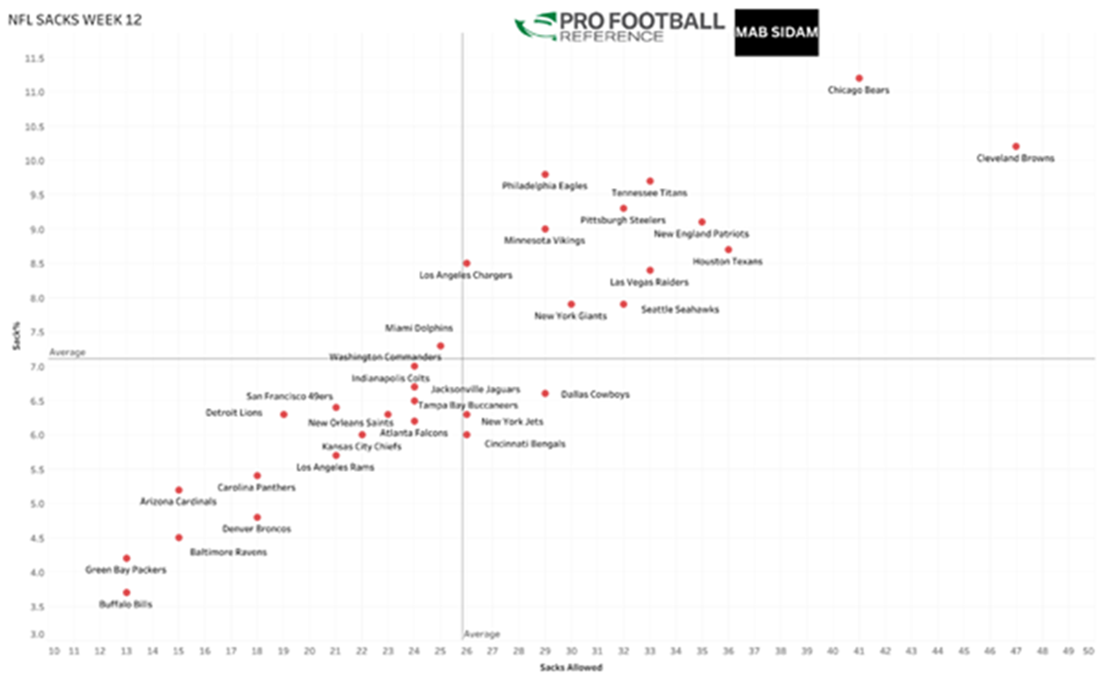
In the NFL, an ineffective offensive line can cripple a team's entire offensive strategy, and the teams with the worst lines are bearing the brunt of this issue. From rookie QBs like Caleb Williams in Chicago to veterans like Jameis Winston in Cleveland, these teams are struggling to find success due to constant pressure in the pocket, leading to frequent sacks, hurried throws, and missed opportunities. Whether it’s the Bears, Browns, or Titans, the lack of protection is hindering both their QBs' development and the overall performance of their offenses. These struggling lines must be addressed if these teams hope to build any form of offensive stability moving forward. Here's a list of the (so far) worst offensive lines in the NFL:
Chicago Bears
As mentioned above, rookie quarterback Caleb Williams is experiencing the harsh realities of playing behind the NFL's worst offensive line. While Williams has faced criticism for holding onto the ball too long, it's hard to blame him entirely. The Bears' line is failing to provide him with the time he needs to survey the field and make effective decisions. With defenders consistently penetrating the pocket, Williams has been under constant pressure, making it nearly impossible for him to develop any rhythm or confidence.
This line is in dire need of an overhaul if the Bears are to build a successful future around their young quarterback. The struggles in pass protection are only part of the issue; the line also struggles with opening up running lanes, which has compounded the team’s offensive woes. Until the Bears make serious improvements upfront, Williams and the rest of the offense will continue to suffer from a lack of protection.
Cleveland Browns
The Cleveland Browns’ offensive line has been ravaged by injuries, leaving QB Jameis Winston in a tough spot. With the most sacks allowed in the NFL, Winston is often under siege, and this relentless pressure is affecting his ability to perform. While Winston has had flashes of success, the inability of the line to consistently protect him has made it difficult to find any offensive stability.
This injury-riddled line also hampers the Browns' running game, as defenders frequently penetrate the backfield before running backs can get going. With key offensive linemen sidelined, Cleveland faces a long road ahead unless they can get healthier or make some significant adjustments in the trenches. Until this line improves, the team will struggle to compete at the highest level.
Tennessee Titans
The Tennessee Titans are rotating quarterbacks between Mason Rudolph and Will Levis, but both are facing an uphill battle behind a porous offensive line. While the Titans' line struggles to keep defenders at bay, it’s clear that any future success starts with improving protection upfront. Both Rudolph and Levis have been pressured heavily, forcing them to rush throws and make poor decisions under duress.
Before the Titans can solve their quarterback dilemma, they need to first address their offensive line woes. A more competent and sturdy line would allow the team to assess their quarterback situation more clearly, with the added benefit of protecting whoever takes the reins moving forward. With significant work needed on both sides of the ball, improving the offensive line should be the Titans' number-one priority for the rest of the year and during the offseason.
New England Patriots
Rookies and veterans alike are struggling behind New England’s offensive line, which has been underperforming all season. Quarterback Drake Maye, the future of the franchise, and journeyman Jacoby Brissett have both faced the consequences of a lackluster line. Maye, in particular, needs time to develop, but the offensive line is failing to provide him with the protection necessary for his growth. Until they can solidify this unit, Maye’s progress will be hindered.
For Brissett, who has been thrust into starting duties, the weak offensive line further compounds his challenges. With defenders consistently pressuring him, Brissett's ability to make effective throws has been stunted. To have any hope for a successful future, the Patriots must urgently address their offensive line and provide their QBs with the security needed to perform at their best. It's also taken its toll on both the RBs and WRs, and they have not had much of an opportunity to consistently get open or have passable running lanes.
Houston Texans
While rookie quarterback CJ Stroud has earned praise for his performance, even his production can't mask the struggles of the Texans' offensive line. Stroud has been forced to hold onto the ball longer than necessary at times, but with precious little time to scan the field, he's often left with few options. The line's inability to provide adequate pass protection has forced Stroud into difficult situations and led to avoidable sacks and hasty decisions.
The Texans must focus on fortifying their offensive line to fully capitalize on Stroud's promising potential. If they don't address the lack of protection, their young star quarterback may be exposed to unnecessary punishment, which could set back his development. By investing in a stronger offensive line, the Texans can build a more stable foundation for their offense moving forward.
Pittsburgh Steelers
Both Justin Fields and Russell Wilson have been affected by Pittsburgh's weak offensive line, which has failed to give them the necessary time and space to succeed. Even Fields, known for his mobility, has been unable to escape constant pressure, making it difficult for him to find rhythm in the pocket. Wilson, too, has struggled, as the offensive line has consistently let defenders into his face, limiting his effectiveness in the passing game.
Until the Steelers improve their offensive line, they risk wasting the talent at quarterback. A revamped line would help Fields or Wilson feel more confident in the pocket, allowing them to make better decisions and execute plays more effectively. This ongoing issue is a major roadblock to the Steelers' success, and a solution must be found soon.
Las Vegas Raiders
QB Gardner Minshew II has been thrust into action for the Raiders after QB Aidan O'Connell’s struggles, but he’s also been forced to work behind a struggling offensive line. Minshew’s ability to move around the pocket has helped at times, but the lack of protection has still led to sacks and hurried throws. Like many quarterbacks in this situation, Minshew has had little time to scan the field, forcing him to make quick decisions under pressure.
For the Raiders to see any success, the offensive line must be addressed. A better line would help stabilize the position, whether it’s Minshew or O'Connell moving forward. Until this issue is fixed, the Raiders' offense will continue to face an uphill battle.
New York Giants
(Now former) Giants QB Daniel Jones had a tough season, and much of his struggles can be attributed to the performance of the Giants' offensive line. With defenders consistently breaking through the line and getting to him quickly, the quarterback had been under constant duress. The inability to provide Jones with adequate protection led to poor decisions and a lack of offensive flow, contributing to the team’s poor performance. While Jones deserves some of the blame for the Giants' poor record, not all of the offensive woes rest on his shoulders.
New York's O-line needs significant upgrades if they are to get the best out of any of their QBs moving forward. With the right protection, interim QB Tommy DeVito could become a more effective quarterback, but for now, the line’s struggles continue to stifle his development. Until this issue is addressed, the Giants will remain stuck in a cycle of offensive inconsistency.
On the flip side, the NFL’s best offensive lines are creating a strong foundation for their teams, providing quarterbacks with the protection they need to thrive. From the Buffalo Bills to the Green Bay Packers, these teams boast solid lines that limit sacks and give their quarterbacks the time to execute plays with precision and confidence. Whether it’s the mobility of Bills QB Josh Allen or the steady pocket presence of Packers' QB Jordan Love, these lines are key to maintaining offensive balance and keeping their teams in contention. With such solid frontlines, these teams can confidently build their offensive schemes and set the stage for success.
Buffalo Bills
QB Josh Allen’s mobility is a game-changer for the Buffalo Bills, and his ability to evade pressure has been a lifesaver on numerous occasions. But what truly sets the Bills apart is their outstanding offensive line, which has allowed the fewest sacks in the entire NFL. With a solid line in front of him, Allen has more time to make plays down the field, whether it’s a big throw or taking off with the ball himself. This protection not only keeps the quarterback safe but also allows the offense to stay balanced and effective.
The Bills' line is a well-coached, cohesive unit that wins in the trenches week after week. Their ability to protect Allen is a crucial element in their offensive success, ensuring that the star quarterback has the time and space to thrive. The combination of Allen’s escapability and this elite line has helped the Bills stay at the top of their division and remain a serious playoff contender.
Green Bay Packers
The Green Bay Packers are another team that benefits greatly from stellar offensive line play. QB Jordan Love is operating behind one of the league's most impressive lines, a unit that has allowed the fewest sacks, tying them with the Bills. This level of protection is invaluable for Love, who has been able to mature into his role without facing constant pressure, giving him the time to read defenses and make accurate throws.
The Packers' line is a well-oiled machine, opening up lanes in the run game while keeping Love’s pocket clean. With a strong offensive line in place, the Packers can continue to build a balanced offense, allowing both Love and their running backs to thrive. This solid protection up front is a key reason the Packers are in the mix for postseason contention, as it allows them to execute their game plan with confidence.
Arizona Cardinals
The Arizona Cardinals’ offense has been firing on all cylinders this season, and much of that success can be attributed to the performance of their offensive line. With a QB like Kyler Murray, whose legs are a constant threat, the line’s ability to provide protection has been crucial. The Cardinals’ line is playing at an elite level, giving Murray time to make decisions and, when necessary, make a quick escape to avoid the pass rush.
While Murray’s elusive play helps avoid sacks, the strong play upfront has been just as important. The Cardinals are leading their division, and a major reason for that is the dominance of their offensive line. By keeping their QB protected and creating lanes for the run game, Arizona’s offensive line has been a key factor in their impressive season, positioning them as a playoff contender.
Baltimore Ravens
QB Lamar Jackson’s mobility is one of the biggest weapons in the NFL, and his ability to escape sacks has been a huge asset for the Baltimore Ravens. However, Jackson isn’t doing it all alone; he’s backed by one of the best offensive lines in the league, which has allowed them to dominate in both the passing and running games. This offensive line provides Jackson with enough time to make plays and, when necessary, allows him to break free from defenders to keep the offense moving.
The Ravens’ offensive line is the perfect complement to Jackson’s skill set. Whether it’s creating running lanes for him or protecting the pocket, the line allows Baltimore to run a high-powered, versatile offense. Their line has played a significant role in keeping Jackson upright and healthy while also keeping the Ravens near the top of the AFC standings.
Carolina Panthers
Despite the Carolina Panthers’ struggles this year, their offensive line has been a rare bright spot. While the team has faced challenges at quarterback, the line has held up remarkably well, allowing minimal pressure on their QBs. With the right protection, the Panthers can provide their next quarterback with a solid foundation to build on. This line has been a silver lining in an otherwise difficult season.
If Carolina can address its quarterback issues this offseason, they’ll have a strong line to rely on moving forward. The stability upfront means that their next signal-caller will have a better chance of finding success. For now, the Panthers can take solace in the fact that their offensive line has performed at a level that bodes well for their future.
Detroit Lions
The Detroit Lions have been one of the most high-scoring teams in the NFL, and a major reason for their offensive success is their outstanding offensive line. The line has done a great job protecting QB Jared Goff, allowing him to operate comfortably without being harassed by defenders. Goff has had plenty of time to go through his progressions, which has led to efficient & big plays in the passing game.
This line doesn’t just protect the quarterback — it also opens up holes for the run game, creating balance and unpredictability for the Lions. With the solid line play, Detroit’s offense has been one of the most potent in the league, and as they continue to build around their line, they remain a serious contender in the NFC.
Denver Broncos
Rookie quarterback Bo Nix is getting a great start to his career in Denver, thanks in large part to the solid offensive line in front of him. The Broncos’ line has done an excellent job of keeping Nix upright, allowing him to focus on reading defenses and making the right decisions. With little pressure coming his way, Nix has had the opportunity to settle into his role and play at a high level.
This offensive line has provided Nix with a strong foundation to build on, making it easier for him to thrive in his first season. The protection upfront has been one of the few bright spots for the Broncos, and if the team continues to keep Nix well-protected, they could develop into a formidable offensive force for years to come.
Philadelphia Eagles
The Philadelphia Eagles’ offensive line has been a key factor in their continued success, especially with Jalen Hurts at quarterback. While Hurts’ mobility plays a huge role in avoiding sacks, the offensive line’s strong play ensures he has plenty of time to operate and make plays. This line has been one of the best in the league at keeping their quarterback protected, allowing the Eagles to run their offense with confidence.
Hurts’ ability to evade pressure is certainly helpful, but the Eagles' offensive line deserves significant credit for creating the conditions for his success. With such a solid foundation upfront, the Eagles’ offense remains one of the most balanced and dangerous in the league, making them a tough team to beat week in and week out.
Seattle Seahawks
The Seattle Seahawks have managed to keep their offense productive despite working with an average offensive line. Quarterback Geno Smith has faced some challenges but is still able to make plays due to his ability to work within the constraints of his line. Though not elite, the offensive line does enough to keep Smith protected, allowing him to maintain solid passing numbers.
While an upgrade would be ideal, Seattle’s offensive line still provides a decent amount of stability. As Smith continues to develop, having an average offensive line has been enough to keep the Seahawks competitive in the NFC, showing that even with limitations upfront, a capable quarterback can still find success.
Minnesota Vikings
Vikings QB Sam Darnold has been putting up big numbers this year, despite playing behind an average offensive line. While the protection hasn’t been terrible, it hasn’t been stellar either, which means Darnold has had to work harder than most quarterbacks to execute plays. Still, he’s managed to keep the Vikings competitive, showing that even with a so-so line, a quarterback can still produce if given enough time.
The Vikings’ offensive line doesn’t consistently dominate, but it gets the job done enough to allow Darnold to stay upright and distribute the ball effectively. While improvements could be made, the line’s ability to perform at a league-average level has helped the Vikings stay in the playoff hunt, making the most of what they have up front.
Los Angeles Chargers
Chargers QB Justin Herbert has been performing well this season, despite an offensive line that falls into the "average" category. The line has done enough to keep Herbert upright, though it hasn’t been flawless. Still, Herbert’s talent shines through, as he’s made plays even with inconsistent protection, proving that a skilled quarterback can thrive even behind a middle-of-the-road line.
The Chargers' offensive line doesn’t necessarily give Herbert all the time he needs, but it hasn’t been a liability either. With enough pass protection to allow Herbert to use his strong arm and make quick decisions, the Chargers have remained competitive. For future success, however, the team will likely need to make upgrades to solidify their line and give Herbert even more of an advantage.
Miami Dolphins
The Miami Dolphins’ offensive line falls into the "average" category, but the average may not be good enough in their case. With quarterback Tua Tagovailoa’s history of concussions, the line needs to be more than just competent. The Dolphins must raise their offensive line play to an elite level to ensure his health and continued success. While Tua has managed to stay upright for most of the season, the added pressure on him could become problematic if the line doesn’t improve.
For a team with such high offensive potential, the average offensive line play could be its Achilles' heel. If Miami can elevate its protection, it can fully capitalize on its explosive offense and make a serious run in the postseason. Until that happens, the Dolphins will have to hope its line can hold up just enough to keep its quarterback safe and productive.
Washington Commanders
Rookie QB Jaden Daniels has had his fair share of challenges this year, but the Washington Commanders’ offensive line has done an average job of protecting him. Daniels’ ability to move around in the pocket has been key to avoiding sacks, but the line has still given him enough time to make plays and settle into his role. The average protection up front has allowed him to grow as a quarterback, even if the overall results haven’t been stellar.
The Commanders' offensive line doesn’t shine, but it does enough to keep Daniels upright and avoid constant pressure. For a rookie, that’s an important step in his development. If the team can continue to improve their line play, Daniels will have a stronger foundation to build on as he matures into a full-time starter.
Indianapolis Colts
The Indianapolis Colts have had to manage some tricky situations at quarterback this season, rotating between QBs Joe Flacco and Anthony Richardson. The offensive line has done a decent job of keeping both quarterbacks protected, but it’s been a tough task given how different the two quarterbacks are in style and play. Flacco’s experience requires different protection than Richardson’s mobility, but the line has done a serviceable job in both scenarios.
Despite the challenges, the Colts’ offensive line has kept the offense moving at an average level. With more consistent play from the line, the team could improve significantly, especially if they settle on one quarterback. If they can solidify their protection, the Colts could have a much more efficient offense moving forward.
Jacksonville Jaguars
QB Trevor Lawrence has had a rough year under center, and a lot of it has to do with his offensive line. While Lawrence has shown flashes of brilliance, the average play from his offensive line has made it difficult for him to execute plays with confidence. The line has struggled to give him enough time to survey the field, leading to rushed throws and missed opportunities.
For the Jaguars to reach their full potential, they need to address the line and give Lawrence the protection he deserves. With a solid line in place, Lawrence has the talent to take the offense to new heights. Until that happens, however, the Jaguars will have to settle for an average offensive line and hope it doesn’t hold them back too much.
Tampa Bay Buccaneers
QB Baker Mayfield has managed to keep the Tampa Bay Buccaneers offense productive this season despite an offensive line that isn’t anything special. The line has done just enough to give Mayfield time to make throws, but it hasn’t been dominant. Mayfield’s ability to make quick decisions and keep the offense moving has been key to keeping the Buccaneers competitive.
With more stability up front, the Bucs could potentially unlock even more of Mayfield’s potential. For now, though, the average line play has kept them at a somewhat steady level. If Tampa Bay wants to compete in the long run, they’ll need to find a way to improve their protection and give Mayfield more time to make plays.
New York Jets
The New York Jets have had a challenging season with an aging Aaron Rodgers at the helm. Despite his experience, Rodgers has had a tough time behind an average offensive line. While the line hasn’t been a disaster, it’s certainly not giving him the time and comfort he needs to execute at a high level. With Rodgers dealing with injuries and inconsistencies, the offensive line’s average performance has been one of the factors holding the team back.
To get the most out of Rodgers and any future quarterbacks, the Jets will need to improve their line. They’ve done just enough to keep things manageable, but moving forward, stronger protection will be essential to keep their offense from stagnating. The Jets’ O-line has been average, but it’s clear they need more to compete at a higher level.
Cincinnati Bengals
QB Joe Burrow has been a bright spot for the Bengals, leading the league in passing yards, but he’s had to do it behind an average offensive line. Despite spending more time holding the ball than most quarterbacks, Burrow has managed to stay productive. The offensive line’s average play has made it harder for Burrow to execute plays without feeling constant pressure, yet he still manages to shine with his impressive ability to extend plays and find open receivers.
For the Bengals to truly thrive, however, they’ll need to figure out how to fix their O-line problems. While Burrow’s talent has kept the offense afloat, the line’s inability to provide consistent protection has prevented them from reaching their full potential. If the Bengals can improve their line, they can take the next step and become a more complete, dangerous team.
Dallas Cowboys
It's an understatement to say that the Dallas Cowboys have had a rough season, and the offensive line’s performance has been one of the contributing factors. Despite having talented skill players, the Cowboys' offensive line struggled to protect QB Dak Prescott, leading to his season-ending injury and missed opportunities. When Prescott (and now backup Cooper Rush) is forced to work under pressure, it disrupts the entire offense and prevents them from hitting on big plays.
If the Cowboys want to turn their season around, improving their offensive line should be a top priority. With better protection, the offense as a whole could perform at a much higher level. While the line hasn’t been awful, its average play has held the Cowboys back from reaching their potential as a high-scoring offense.
Atlanta Falcons
Falcons QB Kirk Cousins has had to make do with an average offensive line in Atlanta, which has limited his ability to operate at his best. As a pocket passer, Cousins tends to hold the ball a bit longer, and when the offensive line isn’t holding up, it’s harder for him to execute plays. The Falcons' offensive line has protected him decently, but it hasn’t been enough to allow him to consistently operate at a high level.
For the Falcons to compete, they’ll need to improve their line and give Cousins more time to make his reads and throws. Though he’s been productive despite the average play up front, Cousins’ style of play requires better protection to maximize his effectiveness. The offensive line has done enough, but a stronger unit would help Atlanta take the next step.
New Orleans Saints
Saints QB Derek Carr is another quarterback who’s had to deal with average offensive line play this season. As a more stationary pocket passer, Carr’s ability to execute relies heavily on the protection his offensive line provides. While the Saints’ line has kept him upright, it hasn’t been enough to help the offense find the consistency needed to compete in a tough NFC South division.
For the Saints to improve, they need to strengthen their offensive line and give Carr more time to make plays down the field. While Carr’s experience has kept him functional despite the average protection, better line play could help the offense reach its full potential. If New Orleans can address this issue, they’ll be better positioned to succeed.
San Francisco 49ers
QB Brock Purdy has been effective for the San Francisco 49ers, and part of the reason for his success is the offensive line’s solid but average performance. The 49ers’ line isn’t the best in the league, but it has been good enough to protect Purdy and give him the chance to make plays. Purdy’s ability to extend plays and avoid pressure has been helpful, but a stronger offensive line would allow him to perform even better.
While the solid but not elite line provides adequate protection for Purdy, improving it would further elevate the team’s offensive performance. For the 49ers to continue competing at a high level, they will likely need to upgrade their line to take advantage of the talent they have on the roster.
Los Angeles Rams
QB Matthew Stafford, known for being less mobile, has faced challenges behind an average offensive line. The Rams’ line has done its best to protect him, but it hasn’t been enough to give him the comfort he needs to excel. He can still make throws when he has time, but the pressure from opposing defenses has led to inconsistency.
For the Rams to improve, they’ll need better play from their offensive line. Stafford’s age and immobility require more time in the pocket, and right now, the average protection has led to missed opportunities. The Rams could maximize Stafford’s arm and improve their overall offensive output with a stronger offensive line.
Kansas City Chiefs
QB Patrick Mahomes has long been known for his ability to escape pressure and make plays on the move. While his mobility helps mitigate some of the struggles of the Kansas City Chiefs offensive line, the line has still done an average job of protecting him. Despite this, Mahomes’ ability to make plays when the pocket breaks down has allowed the Chiefs to remain one of the most dangerous offenses in the league.
While Mahomes can cover up some of the line's shortcomings, improving the protection up front would help the Chiefs’ offense reach new heights. The offensive line isn’t a glaring issue, but for a team with Super Bowl aspirations, better play from the front five would make all the difference in Mahomes' ability to execute even more efficiently.
In conclusion, the offensive line is a critical component of an NFL team's success, often determining the fate of its season. Teams with weak offensive lines, such as the Bears, Browns, and Titans, are struggling to protect their quarterbacks, leading to high sack totals, hurried throws, and missed offensive opportunities. These teams must prioritize fixing their offensive lines to give their quarterbacks a chance to develop and succeed. Without improvements in the trenches, it will be difficult for these teams to find offensive stability and build for the future.
On the other hand, teams with strong offensive lines, like the Buffalo Bills, have a solid foundation for success. A well-coached and cohesive line gives quarterbacks the time and space they need to make plays, whether through the air or on the ground. With elite protection, these teams can execute their offensive schemes effectively, setting the stage for playoff runs and championship aspirations. In the NFL, winning truly begins in the trenches, where offensive lines can make or break a team’s season.

